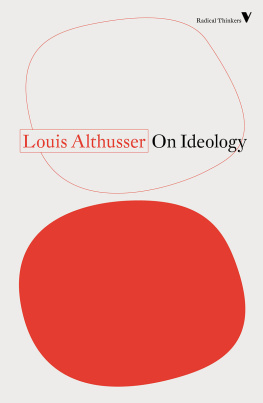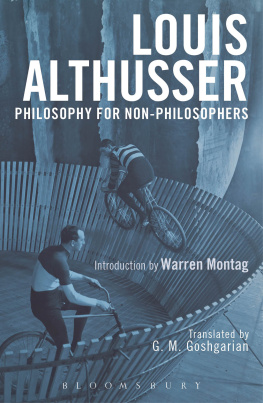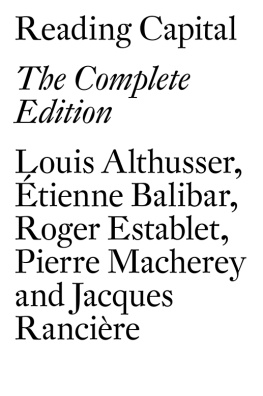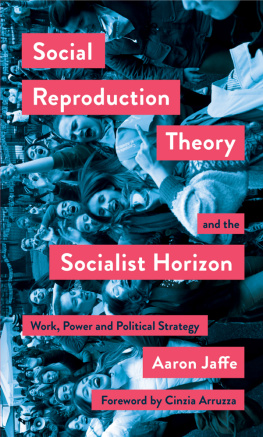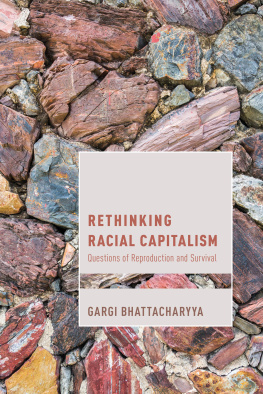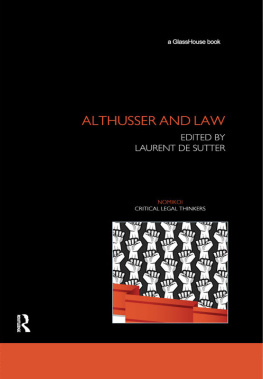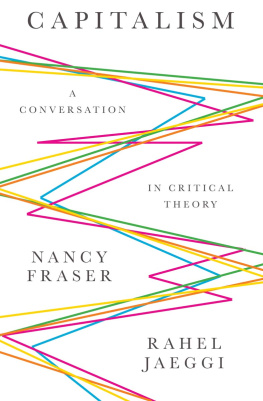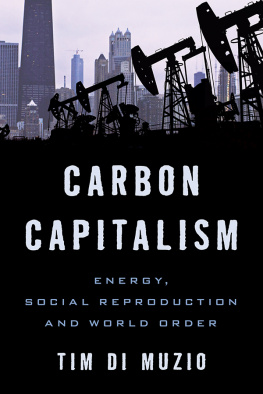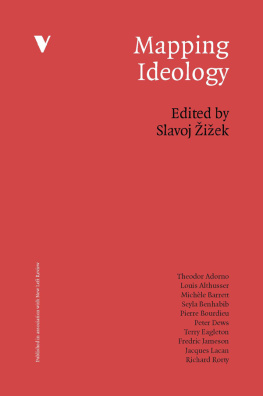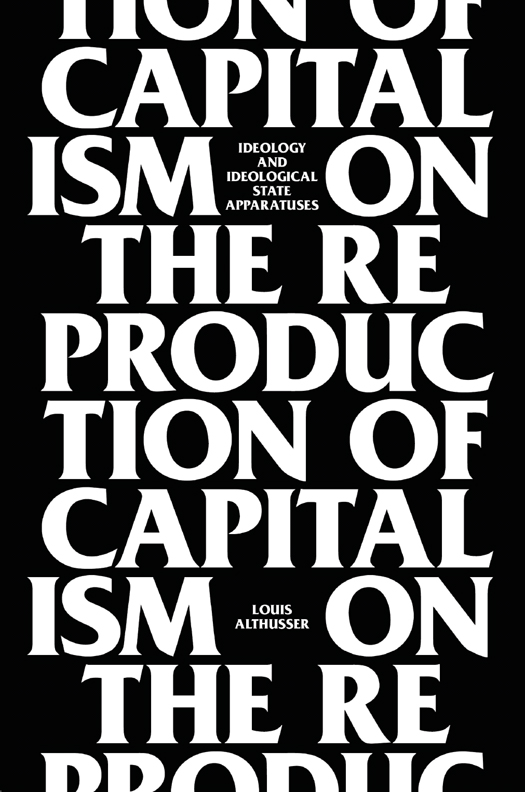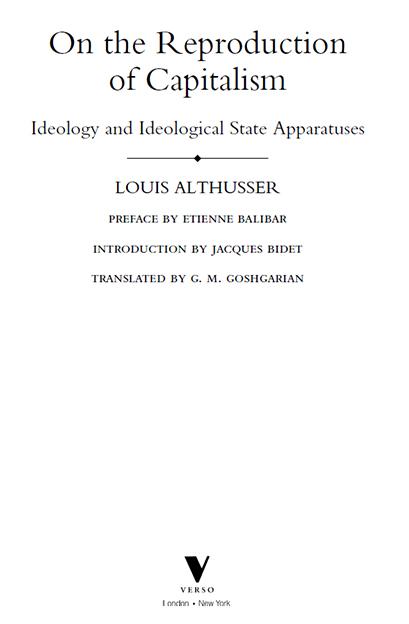LOUIS ALTHUSSER was born in Algeria in 1918 and died in France in 1990. He taught philosophy for many years at the cole Normale Suprieure in Paris and was a leading intellectual in the French Communist Party. His books include For Marx; Reading Capital (with Etienne Balibar); On Ideology; Politics and History: Montesquieu, Rousseau, Marx; Machiavelli and Us; and The Specture of Hegel.
This English-language edition published by Verso 2014
Translation G. M. Goshgarian 2014
First published as Sur la reproduction
Presses Universitaires de France 1995
Preface Etienne Balibar 2014
Introduction Jacques Bidet 2014
Ideology and Ideological State Apparatuses first appeared in Louis Althusser, Lenin and Philosophy and Other Essays, trans. Ben Brewster, London, New Left Books, 1971. The translation has been modified.
Ideology and Ideological State Apparatuses, translation
Ben Brewster 1971, 1994, 2014
All rights reserved
The moral rights of the authors have been asserted
Verso
UK: 6 Meard Street, London W1F 0EG
US: 20 Jay Street, Suite 1010, Brooklyn, NY 11201
www.versobooks.com
Verso is the imprint of New Left Books
ISBN-13: 978-1-78168-164-0 (PBK)
ISBN-13: 978-1-78168-165-7 (HBK)
eISBN-13: 978-1-78168-215-9 (US)
eISBN-13: 978-1-78168-524-2 (UK)
British Library Cataloguing in Publication Data
A catalogue record for this book is available from the British Library.
Library of Congress Cataloging-in-Publication Data
Althusser, Louis, 1918-1990.
[Sur la reproduction. English]
On the reproduction of capitalism : ideology and ideological state apparatuses / Louis Althusser ; preface by Etienne Balibar ; introduction by Jacques Bidet ; translated by G.M. Goshgarian.
pages cm
First published as Sur la reproduction, [copyright] Presses Universitaires de France 1995.
ISBN 978-1-78168-164-0 (pbk. : alk. paper) ISBN 978-1-78168-165-7 (hardback : alk. paper) 1. Production (Economic theory) 2. Marxian economics. 3. Capitalism. 4. State, The. 5. Social conflict. I. Title.
HB241.A5613 2013
335.412dc23
2013033117
v3.1
Contents
FOREWORD
Althusser and the Ideological State Apparatuses
Etienne Balibar
Jacques Bidet and the Presses Universitaires de France have invited me to contribute an additional introduction to the second edition of Althussers posthumously published book Sur la reproduction, which they first published in 1995. Since then, there has been steady demand for the book. I am touched and honoured by their invitation, and am very happy that they have accepted, by way of a contribution to their enterprise, a text that is not absolutely new, because it was written some time ago and has already been published, albeit not in French. It is the preface that I wrote for Ariella Azoulays Hebrew translation of the chapter from Althussers text entitled On Ideology.
In the present brief preface, I do not want to make a detailed commentary on Althussers text about Ideological State Apparatuses [ISAs], now translated into Hebrew for the first time. In response to a request from Ariella Azoulay, whom I very warmly thank for soliciting a contribution from me and then waiting patiently for it, I would simply like to offer a few remarks about the texts status and the conditions under which it was produced.
I believe it can be said that this text has become, and will remain, one of its authors major works. It is one of those that serve as a reference point when it is a question of characterizing his thought; one mobilizing concept that bears his personal signature and is immediately recognizable as his (here, Ideological State Apparatuses and ideological interpellation; elsewhere, the epistemological break, symptomatic reading, and so on); finally, one that contemporary philosophy in the structuralist or post-structuralist line continues to work on. Yet its status even when it is considered in the context of a fragmentary, unfinished and largely posthumous text is altogether paradoxical.
To begin with, which text are we talking about? Given the modalities of its release and re-release, it is impossible to assign it a unique identity today or to trace its boundaries with certainty. On the contrary: we have to recall its history and inscribe it in various, partially competing ensembles so as to understand how it is that the commentaries it has elicited, which today accompany it or prescribe the way it is read, can be so divergent. The text translated into Hebrew comprises being submitted to others for discussion. Since the ongoing study was never finished and was not published in its authors lifetime, while the debate occasioned by the extracts was very lively and substantial in a number of different countries, it is safe to assume that most commentators will continue to refer to this historic version. I shall, therefore, say something about the circumstances and causes of this imbroglio.
Jacques Bidet, in his critical and philological introduction, says that there exist two versions of the complete manuscript of De la superstructure from which these extracts were taken. Both are unfinished. The first, approximately 150 pages long, was written in MarchApril 1969. The second, some 200 pages long, is undated; it revises and augments the first. The 1970 Pense piece, made up of extracts from (On Ideology), lies, Bidet surmises, somewhere between the two versions, independently of the cuts, condensations and addenda that mark it. All this is incomprehensible if we do not explain what led Althusser to release such a partial montage rather than a text that was complete, but unfinished and, in fact, unfinishable.
To explain that, we have to go back to the way Althussers illness (which the psychiatrists called a manic-depressive psychosis) was bound up with the political circumstances of the day. In MayJune 1968, at the time of the events that Althusser himself described, after the fact, as an ideological revolt of the masses of young people in the school system),
Althussers manuscript Sur la reproduction ended up joining a series of other texts in various states of completion that he turned out between 1968 and 1980. These often took the form of treatises or popularized essays written on the model of the classical Marxist introductions to historical materialism; he worked on them when his illness was in remission and left them unfinished. Some have now been published in collections of his posthumous works.
In 1970, however, when Althusser returned to active life, friends of his, notably Marcel Cornu, editor of the review La Pense, invited him to share some of his work in progress with the public. It now seemed to Althusser that an elaboration of his views on ideology could spark another round in a discussion that, he hoped, would help him get back to work. This is what motivated the montage of extracts that he published under the title Idologie et appareils idologiques dEtat [Ideology and Ideological State Apparatuses]. Destiny was to convert this stopgap solution into something with definitive or, at any rate, long-term status. For it was on the faith of impressions spawned by the conjunction of two fundamentally discontinuous series of arguments one centred on the question of the reproduction of the relations of production, the other on the ideological mechanism of interpellation, recognition and guarantee that the commentaries, utilizations and critiques were to be based. At the point of aporetic encounter between the two lay the notion, or cabbalistic expression, ISAs.



